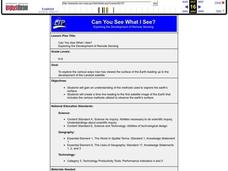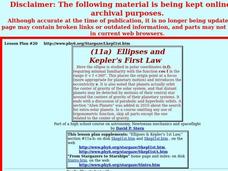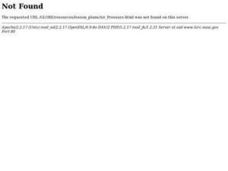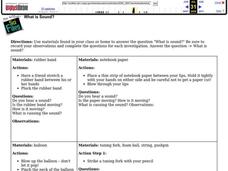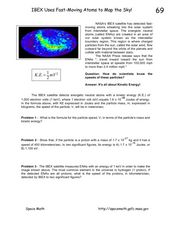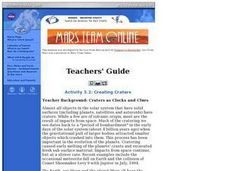Curated OER
Introducing Habitats and Biodiversity
Students identify habitats in Arizona. Theys define and illustrate a food web, and explain the importance fo biodiversity.
Curated OER
Interplanetary Travel Guide
In groups of six, middle school space scientists create an imaginative travel brochure for attracting visitors to the planet Mars. Information must include surface features and atmospheric conditions. Although time-consuming, this is a...
Curated OER
Antacid Tablet Race
Young scholars complete experiments to determine how rocket fuel is affected by surface area and temperature. They compare the reaction rates of antacid tablets. They discuss their results to complete the lesson.
Curated OER
Can You See What I See?
Students gain an understanding of the methods used to explore the earth's surface. Students create a time line leading to the first satellite image of the Earth that includes the various methods utilized to observe the earth's surface.
Curated OER
Where Do I Live?
Young scholars gain a better understanding of the population of the region they live in by comparing U.S. census data on the internet.
Curated OER
What's The Weather?
Students explore the role that remote sensing plays in predicting our weather. Students investigate weather websites, and read about the three kinds of clouds. Students record and draw their observations in science journals.
Curated OER
Trees of Mississippi
Students research tree species found in Mississippi, and record the tree types, numbers of trees, and locations. Students then research the forest industry sites, and determine possible relationships between industry location and tree...
Curated OER
Sequencing From Close To Far
Students explore how objects stay the same size and only "look" like they change when closer are farther from the object. They sequence aerial photos and satellite images from closest to farthest.
Curated OER
What Color is It?
Students indentify whether an objects reflects or absorbs red, green, and/or blue light. They create a simple spectral signature.
Curated OER
Radiation Budget Lesson: Exploring Albedo
Students experiment with sunlight and temperature. They study the definition of albedo, or the percentage of incoming sunlight that is reflected, rather than absorbed.
Curated OER
Ellipses and Kepler's First Law
The class examines graphs in the form r = F(¿¿) in polar coordinates (r, ¿¿), in particular with the circle, ellipse and other conic sections. They determine the nature of an ellipse by studying the role of the semimajor axis and...
Curated OER
Air Pressure is Powerful
Students make a barometer and write a paragraph describing how they did it.
Curated OER
Altitude Tracking
Learners estimate the altitude of a rocket during several flights. They create their own altitude tracking devise. They examine and discuss their results at the end of the activity.
Curated OER
Rocketry
Students design and construct a paper rocket that can be launched with a drinking straw. They participate in a lecture and read an article about rocketry and how Newton's Third Law applies to rocket launches. Each student constructs...
Curated OER
Algebra: Mirror, Mirror on the Universe
Students assess how algebra, telescopes, space exploration and optics are so important in astronomy. They encounter studies on the Hubble Space Telescope, Hubble Deep Field and how algebra helps to determine the effects of contamination...
Curated OER
Mixing and Stirring
Students experience mixing through dancing. In this physical science lesson plan, students not only dance to show mixing but also demonstrate mixing and stirring by combining milk and chocolate milk.
Curated OER
What is Sound?
In this sound worksheet, learners complete 4 investigations to explore sound. These include the use of a rubber band, a blown up balloon, a piece of notebook paper and a tuning fork with a foam ball, string and pushpin. Students answer...
Curated OER
Activity on United States Moon Landing: Apollo 11
Students use the World Wide Web to access additional information needed to complete a set of questions. They demonstrate an understanding of latitude and longitude by interpreting a lunar map.
Curated OER
What's the Frequency, Roy G. Biv?
Students examine the concept of frequency and wavelength. They analyze how frequency and wavelength relate to each other by conducting an experiment involving measuring and timing wavelengths by pulling adding machine tape through an...
Curated OER
Spitzer Explores a Dying Star
In this dying star worksheet, students read about the Spitzer Space Telescope that detected the dying star-Messier-57. Students solve 6 problems including determining the total power produced by the dying star, they find the total mass...
Curated OER
IBEX Uses Fast-Moving Atoms to Map the Sky!
In this energetic neutral atoms activity, learners solve 3 problems including determining the formula for particle speed, writing the equation to show the relationship between mass, energy and speed and determining the speed of protons...
Curated OER
Creating Craters
Students explore parts of an impact crater and compare and contrast craters found in Earth, the Moon, and Mars. Crater formation is modelled and the relationship of mass, velocity, and size of the projectile to the crater formation is...
Curated OER
Rocket Car
Students construct a balloon-powered rocket car from a Styrofoam tray, pins, tape, and a flexible straw, and test it along a measured track on the floor. They experiment with ways of increasing the distance the rocket car travels.





